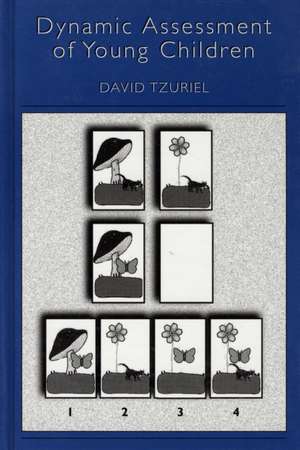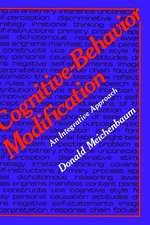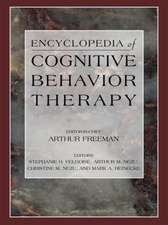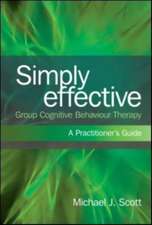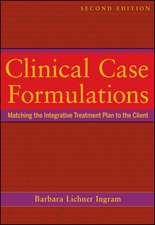Dynamic Assessment of Young Children: The Springer Series on Human Exceptionality
Autor David Tzurielen Limba Engleză Hardback – 31 aug 2001
| Toate formatele și edițiile | Preț | Express |
|---|---|---|
| Paperback (1) | 997.22 lei 6-8 săpt. | |
| Springer Us – 17 sep 2012 | 997.22 lei 6-8 săpt. | |
| Hardback (1) | 1004.19 lei 6-8 săpt. | |
| Springer Us – 31 aug 2001 | 1004.19 lei 6-8 săpt. |
Din seria The Springer Series on Human Exceptionality
- 18%
 Preț: 1013.96 lei
Preț: 1013.96 lei - 15%
 Preț: 645.14 lei
Preț: 645.14 lei - 18%
 Preț: 976.54 lei
Preț: 976.54 lei - 5%
 Preț: 718.10 lei
Preț: 718.10 lei -
 Preț: 384.48 lei
Preț: 384.48 lei - 15%
 Preț: 645.79 lei
Preț: 645.79 lei - 5%
 Preț: 608.75 lei
Preț: 608.75 lei - 18%
 Preț: 954.62 lei
Preț: 954.62 lei -
 Preț: 390.46 lei
Preț: 390.46 lei -
 Preț: 386.99 lei
Preț: 386.99 lei - 18%
 Preț: 905.68 lei
Preț: 905.68 lei - 20%
 Preț: 552.12 lei
Preț: 552.12 lei - 15%
 Preț: 533.72 lei
Preț: 533.72 lei - 18%
 Preț: 1404.15 lei
Preț: 1404.15 lei - 18%
 Preț: 1115.63 lei
Preț: 1115.63 lei - 15%
 Preț: 643.48 lei
Preț: 643.48 lei - 18%
 Preț: 1123.04 lei
Preț: 1123.04 lei
Preț: 1004.19 lei
Preț vechi: 1224.62 lei
-18% Nou
Puncte Express: 1506
Preț estimativ în valută:
192.17€ • 199.49$ • 160.24£
192.17€ • 199.49$ • 160.24£
Carte tipărită la comandă
Livrare economică 22 martie-05 aprilie
Preluare comenzi: 021 569.72.76
Specificații
ISBN-13: 9780306465109
ISBN-10: 0306465108
Pagini: 241
Ilustrații: XVI, 241 p.
Dimensiuni: 155 x 235 x 24 mm
Greutate: 0.57 kg
Ediția:2001
Editura: Springer Us
Colecția Springer
Seria The Springer Series on Human Exceptionality
Locul publicării:New York, NY, United States
ISBN-10: 0306465108
Pagini: 241
Ilustrații: XVI, 241 p.
Dimensiuni: 155 x 235 x 24 mm
Greutate: 0.57 kg
Ediția:2001
Editura: Springer Us
Colecția Springer
Seria The Springer Series on Human Exceptionality
Locul publicării:New York, NY, United States
Public țintă
ResearchCuprins
1. Dynamic-Interactive Approaches to Assessment of Learning Potential.- Criticism of Standardized Testing.- Historical and Social Background.- Definition of Dynamic Assessment (DA).- Issues Related to DA.- Purposes of the Book.- 2. Vygotsky’s Socio-Cultural Theory and Applications for Assessment.- Historical Background.- The Concepts of Zone of Proximal Development (ZPD) and Internalization.- Implications of the ZPD Concept.- The “Graduated Prompt” Approach.- The Learntest Approach.- 3. The Mediated Learning Experience (MLE) Theory.- The Background of MLE Theory Development.- Basic Assumptions of the MLE Theory.- The Concept of Cognitive Modifiability.- Definition of MLE.- Distal and Proximal Etiology of Cognitive Development.- Criteria of MLE.- Use of Mediation in DA Procedures.- Cultural Difference versus Cultural Deprivation.- The Differences among Feuerstein, Piaget, and Vygotsky.- Assessment Procedures of the Learning Propensity Assessment Device (LPAD).- The LPAD Instruments.- Reliability of the LPAD.- Research Perspectives of the LPAD.- Group Dynamic Assessment.- Clinical-Educational Research.- Use of the LPAD in Cognitive Education Programs.- 4. Distinctive Features of the Clinical DA Approach.- Impulsivity and Test Performance: A Case Study.- Goals of DA.- Cognitive Functions.- Four Shifts from Standardized-Conventional Testing to DA.- A Triadic Model of Examiner, Task, and Child.- Taxonomy of DA Approaches.- Conditions for Use of DA.- 5. Dynamic Assessment of Young Children: Principles, Approaches, and Procedures.- Adaptation of Test Materials to Child’s Developmental Level.- “Bridging” of Concrete Operations to Abstract Level of Functioning.- Communication Aspects in DA of Young Children.- Clinical/Educational and Measurement/Research Versions ofDA.- Baseline Preliminary Phase as an Integrative Component of DA.- Scoring Methods for the Measurement/Research Version.- Transfer Problems.- Comparison of Modifiability Indices across Difficulty Level and Task Dimensions.- Assessment of Nonintellective Factors and Their Modifiability.- Creativity in Construction of Problems by Examiner and Examinee.- 6. Dynamic Assessment Instruments for Young Children.- The Children’s Analogical Thinking Modifiability Test.- The Children’s Inferential Thinking Modifiability Test.- The Frame Test of Cognitive Modifiability.- The Children’s Seriational Thinking Modifiability Test.- The Complex Figure Test.- The Cognitive Modifiability Battery: Assessment and Intervention.- The Seria-Think Instrument.- The Children’s Conceptual and Perceptual Analogies Modifiability (CCPAM) Test.- 7. Educational Aspects of Dynamic Assessment.- The Utility of DA with Children of Different SES Levels.- DA of Children with Mental Handicaps, Developmental Delays, and Specific Learning Difficulties.- DA of Deaf Children.- The Relation between Item Difficulty and Performance Improvement after Mediation.- DA of Culturally Different Children.- DA of Children with Language Deficits.- Comparison of Different Mediational Strategies in DA.- Prediction of School Achievement by Static versus DA Measures.- DA and Reflectivity-Impulsivity Dimension.- DA in a Computer Assisted (CA) Environment.- Case Study: A Child with Specific Learning Difficulties.- 8. Use of DA from Developmental-Cognitive Perspectives.- Rationale for Use of DA in Developmental-Cognitive Studies.- Studies Derived from General Cognitive Developmental Models.- Advantages of the MLE Model.- Methodological Aspects of the MLE Model.- Measurement of Cognitive Modifiability with DA Instruments.-MLE Research with Infants and Toddlers.- MLE Research with Kindergarten and School-Age Children.- 9. Use of Dynamic Assessment in Evaluation of Cognitive Education Programs.- The Rationale of Using DA for Evaluation of Cognitive Education Programs.- The Bright Start Program.- The Structured Program of Visual Motor Integration (SP-VMI).- The Peer Mediation with Young Children (PMYC) Program.- 10. Epilogue.- Cross-Cultural Dilemmas of Practicing Cognitive Education.- Why Is Implementation of DA Difficult?.- Some Unresolved Issues.- Is Cognitive Modifiability Generalized across Domains?.- Prediction of School Achievements by DA versus Static Measures.- Reliability of DA.- Validity of DA.- The Need for a Transactional Ecological Model in Mediated Learning Interactions.- The Family as a Mediational Unit.- Does Quantity of Interactions Transform into Quality?.- Does MLE Process Transfer across Contexts?.- The Question of the Outcome Measures.- Can We Predict Cognitive Modifiability?.- References.
Recenzii
"This book is a must read for graduate student, scholar, or practitioner in psychoeducational assessment. At the least, it will provide an introduction to dynamic assessment, and at the most it will change one's philosophy of cognitive measurement."
(Choice, 39:6 (2002)
"...superbly focused and densely packed with helpful information for any educational or clinical psychologist or researcher seeking a comprehensive introduction to the theory and practice of dynamic assessment. [...] Tzuriel provides an excellent overview of much of the key research into the validity, reliability and overall value of dynamic assessment whilst at the same time confronting many of its most powerful critics with logical and carefully balanced rebuttals. ...will come to be considered a standard classic in this field and I have no hesitation in recommending it to anyone seeking an accessible introduction to the static vs dynamic assessment debate."
(Professor Robert Burden in British Journal of Educational Psychology)
"An important contribution to dynamic assessment are Tzuriels DA tests for younger children, which are based directly on Feuerstein's theories... The book is a timely and welcome summary of Tzurieltensive involvement in DA. Tzuriel has opened up a lot of lines of investigation, and the many unanswered questions invite future research, in DA test development as well as in applications of DA to school achievement, and in the prevention of failure for at-risk children."
(Ruth Deutsch in Journal of Cognitive Education and Psychology, 2:3 (December 2002)
"...Highly readable and accesible to a broad audience. [...] Tzuriel achieves the goals of presenting both current theory and clinical applications. He effectively interweaves research and practice in a way that provides detailed information about experimental studies while simultaneously explaining real-life applications of the work." ( ElizabethD. Peña in Journal of Psychoeducational Assessment, 22 (2004)
(Choice, 39:6 (2002)
"...superbly focused and densely packed with helpful information for any educational or clinical psychologist or researcher seeking a comprehensive introduction to the theory and practice of dynamic assessment. [...] Tzuriel provides an excellent overview of much of the key research into the validity, reliability and overall value of dynamic assessment whilst at the same time confronting many of its most powerful critics with logical and carefully balanced rebuttals. ...will come to be considered a standard classic in this field and I have no hesitation in recommending it to anyone seeking an accessible introduction to the static vs dynamic assessment debate."
(Professor Robert Burden in British Journal of Educational Psychology)
"An important contribution to dynamic assessment are Tzuriels DA tests for younger children, which are based directly on Feuerstein's theories... The book is a timely and welcome summary of Tzurieltensive involvement in DA. Tzuriel has opened up a lot of lines of investigation, and the many unanswered questions invite future research, in DA test development as well as in applications of DA to school achievement, and in the prevention of failure for at-risk children."
(Ruth Deutsch in Journal of Cognitive Education and Psychology, 2:3 (December 2002)
"...Highly readable and accesible to a broad audience. [...] Tzuriel achieves the goals of presenting both current theory and clinical applications. He effectively interweaves research and practice in a way that provides detailed information about experimental studies while simultaneously explaining real-life applications of the work." ( ElizabethD. Peña in Journal of Psychoeducational Assessment, 22 (2004)
